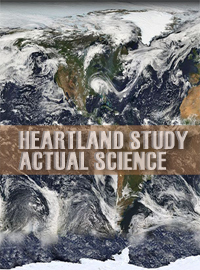| The Elusive Apocalypse: Global Warming’s Doomsday Keeps Getting Delayed |
 |
|
By Troy Senik
Wednesday, September 25 2013 |
Harold Camping is one of those figures who embodies Andy Warhol’s dictum that, “in the future, everyone will be world famous for fifteen minutes.” If Camping’s name sounds vaguely familiar, it’s because the radio evangelist briefly garnered national headlines a few years ago with his prediction that the world would come to an end on May 21, 2011. When that fell through, Camping subsequently “reinterpreted” his vision to foretell an October 21, 2011, oblivion – apparently having been the victim of a divine typo. After that date also passed without event, Camping submitted to the only logical response – he shut up. Many mainstream Christian groups kept him at arm’s length as well, not wanting their adherents to believe that loyalty to their faith required assent to Camping’s bizarre brand of prophecy. It’s instructive that Camping and his followers – believing they were receiving revelations of divine truth – demonstrated a greater capacity to admit error than the equally apocalyptic devotees of the theory of catastrophic global warming – ostensibly a product of rigorous, humble science. In 2007, the BBC, citing an American scientist who claimed his projections were “conservative,” predicted that global warming would leave the Arctic entirely devoid of ice by the summer of this year. Yet when the season came to a close last weekend, the North Pole had 60 percent more ice than the year prior. The Northwest Passage had been frozen shut all year. It was also in 2007 that the United Nations’ Intergovernmental Panel on Climate Change (IPCC) – which would end up sharing a Nobel Peace Prize with Al Gore – issued a report on the threat to the planet with a projection of global temperatures increasing by 0.36 degrees Fahrenheit per decade. A recent leak of the panel’s forthcoming update to that report acknowledges that the actual increase was only 0.09 degrees. In other words, the men and women who’d like their soothsaying to become the basis for western economic policy overstated the threat by a factor of four. A 1,000-page study released last week by the Heartland Institute’s Nongovernmental Panel on Climate Change (relying on many of the same source materials as the IPCC) struck a notably less alarmist tone, finding no statistically significant warming for the past decade and a half. The panel characterized the threat as so small that it was “embedded within the background variability of the natural climate system.” Temperate, empirical, modulated – this is what actual science looks like. The problem with the pious certainty with which the left approaches global warming (these are people who actually compare skeptics of a hotly-contested scientific theory with skeptics of the Holocaust) is its failure to account for the many questions that must be answered to make a reasonable assessment of how (or whether) the government should respond to climate change: Is it real? If so, how dangerous is it? To what extent is it caused by human behavior? Is it possible to slow or stop its progress? If so, do the benefits of such actions outweigh the costs? You won’t find any such nuanced meditations on the left, particularly not from President Obama, who said in his Second Inaugural Address: “We will respond to the threat of climate change, knowing that the failure to do so would betray our children and future generations. Some may still deny the overwhelming judgment of science, but none can avoid the devastating impact of raging fires and crippling drought and more powerful storms.” Apart from the melodrama, there is some factual overreach going on here. As the University of Colorado’s Roger Pielke recently noted before the Senate Environment and Public Works Committee: “It is misleading, and just plain incorrect, to claim that disasters associated with hurricanes, tornados, floods or droughts have increased on climate timescales either in the United States or globally. It is further incorrect to associate the increasing costs of disasters with the emission of greenhouse gases.” The liberal overstatement comes at a price. Using slightly less ominous language to describe the consequences of global warming might have cost the left some momentum on the issue – but not nearly as much as will accrue over time, when the predictions of desolation fail to bear fruit. Indeed, a June Pew poll that showed 60 percent of the American public unwilling to classify global warming as a “major threat” may be a leading indicator that that’s already happening. You would think by now that President Obama – he of the shovel-ready jobs, “you can keep your health plan if you like it” and the red line in Syria – would have learned a lesson or two regarding being too certain about the way the world works. Or, like Harold Camping, you’d think that he’d at least have learned to shut up. |
Related Articles : |
























